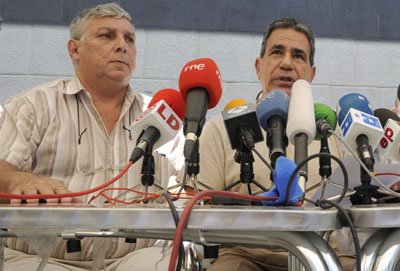In 2010, following midsummer negotiations between the Catholic Church and the government of President Raúl Castro, Cuban authorities began releasing imprisoned journalists, sending them into forced exile with their families. In April 2011, the last of more than 20 journalists arrived in Spain. They had been granted liberty and respite, and were promised support from Spanish authorities while they settled into the new country. But almost two years after the first crop of journalists arrived in Spain, the four who remain in the country are living under extremely difficult conditions, struggling even to feed themselves.
• Related: Integration or disintegration?
Mijaíl Bárzaga Lugo, Julio César Gálvez Rodríguez, Ricardo González Alfonso, and Omar Rodríguez Saludes were among the 29 reporters and editors scooped up by Cuba during a 2003 massive crackdown on the island’s dissidents and independent press. Bárzaga Lugo, a reporter for the independent news agency Agencia Noticiosa Cubana, was handed a 15-year prison sentence; Gálvez Rodríguez, a veteran journalist, was also given 15 years; Ricardo González Alfonso, a freelance reporter, poet, and correspondent for Reporters without Borders, got 20 years; and photographer Rodríguez Saludes was handed a whopping 27 years in jail. The inhuman conditions in which they lived behind bars included rotten food, withheld medical attention, and overflowing toilets, just to name a few. At home, their families were continuously harassed by authorities and neighbors for being linked to Cuba’s dissidence.
The four journalists arrived in Spain in July 2011. They travelled with their immediate and extended families. Before leaving, they were promised financial support to cover rent and other basic needs such as food, utilities, and transportation, the journalists said. Government support, explained Rodríguez Saludes, was initially to last one year. However, if the journalists and their families were still unable to support themselves by the end of this period, assistance could be extended for up to 12 additional months, the photographer told CPJ. None of the four families have been in Spain longer than 24 months, and yet, they have all stopped receiving financial aid.
Gálvez Rodríguez, 67, said he has applied for 22 job openings since he arrived in Spain. “Every time, they tell me the same thing — that I am very qualified and have an incredible résumé, but that, unfortunately, I am over the retirement age.” Rodríguez Saludes, 46, has not stopped looking either, but he has also been unable to find a job. His wife and sister-in-law, he said, have jobs as domestic workers. Each works only two hours a day.
Children continue to receive a free education. However, with no income coming in and other basic needs, such as food, taking precedence, some of the children have stopped attending school. The journalists explained that they are no longer able to pay school lunch fees, or for the metro trip from home to the school. “A one kilometer walk might be nice if you’re doing it for pleasure,” said Gálvez Rodríguez of the distance between his apartment and his seven-year-old son’s school. “It is simply undoable for a child every morning and evening.” Last week, Gálvez Rodríguez simply stopped taking his son to school.
As with education, the journalists and their families continue to have access to free health care. Medications and other medical necessities, however, have to be paid for out of pocket. Bárzaga Lugo, for instance, said he is liable for a series of medical expenses — including a wheelchair — needed for daily support of his 74-year-old mother, who is senile.
By CPJ’s latest count, 15 of the journalists forced into exile have now traveled to the United States in search of better situations. (One more, José Ubaldo Izquierdo Hernández, went immediately to Chile from Spain.) Of the four who remain in Spain, Bárzaga Lugo, Gálvez Rodríguez and Rodríguez Saludes said they are also looking to leave.
A fifth journalist who was in Spain, Albert Santiago Du Bouchet Hernández, killed himself last month. Although no one knows exactly what drove Du Bouchet Hernández to this desperate action, friends said he had been experiencing many difficulties.
“We are living very difficult times right now,” said Bárzaga Lugo via e-mail yesterday. “In the two houses that my family shares, the refrigerators are empty, there is no food. We have also not paid the last month’s rent, not to mention electricity and water bills. Whatever I tell you couldn’t possibly describe our situation.”
